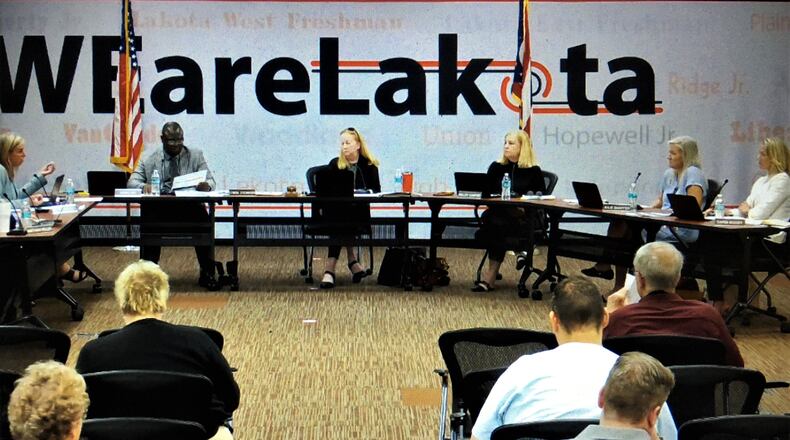Jenni Logan, treasurer of Lakota Schools, said the district has enjoyed a stretch of 10 years of balanced budgets but that could change in 2024 for a number of reasons including the district losing $1.6 million in state and federal COVID-19 pandemic relief funds.
“We are financially healthy and 2022 marks a decade of balanced budgets for the district and that is something to celebrate,” Logan told the Lakota Board of Education during a rare, mid-day work session meeting.
The board was forced to meet at noon Thursday due to a previously scheduled district changeover in computer software, according to Board President Lynda O’Connor.
Logan also told the board there is “no operating levy need that is predicted in this forecast.”
Lakota’s annual operating budget is more than $184 million for the 17,000-student district, which is the largest in Butler County and the ninth-most populous in Ohio.
But Logan warned the board of the problematic nature of making five-year financial projections while on-going inflation is being experienced nationwide.
Moreover, she said the usually unpredictable nature of Ohio’s school funding levels for local school systems, via changing state biennium budgets, cannot be predicted.
O’Connor echoed Logan’s comments, saying: “Economic conditions are more uncertain,” and cautioned fellow board members they would be discussing in the future “some hard topics” regarding Lakota’s finances.
The board voted 4-0 to approve Logan’s five-year financial forecast with member Darbi Boddy abstaining.
Boddy told the board she has not yet received from district administration officials some of the financial operations information she has requested and did not feel comfortable casting a vote.
In other board action, O’Connor opened the meeting by telling her colleagues she plans to bring a proposed board resolution in the future that would require board members to undergo the same background checks required of all volunteers in Lakota schools.
In Ohio, all adult school volunteers must pass criminal background checks before being allowed to work in schools or otherwise interact with students.
Initial reaction from some other board members was supportive of such a change in requirements for Lakota board members, with some citing they have already undergone background checks to perform volunteer work in schools.
Boddy, however, objected to the idea proposed by O’Connor, saying “I don’t think it’s necessary” and called it “a political ruse.”
In April, Boddy was censored and asked to resign by fellow board members. Then earlier this month she was involved in a disputed visit to two Lakota schools where she was accused by school building officials of not following visitor prohibitions against walking through buildings unaccompanied.
Boddy contended other publicly elected officials do not have to undergo background checks but member Kelley Casper said “most elected officials don’t have access to 17,000 students,” referring to Lakota’s enrollment.
On Friday Boddy offered more comments regarding the proposed board member background checks, saying her initial rejections during Thursday’s meeting pertained to “the timing and the way it was presented.”
“My fellow board members all got together and apparently they simultaneously went out and got background checks without saying anything to me, then announced it in the board meeting. That is political and that’s what I was referring to,” she said.
“I have promoted background checks for decades as well as during my campaign. I have never been against them.”
O’Connor did not say when she will offer her proposed resolution up for board vote.
About the Author

